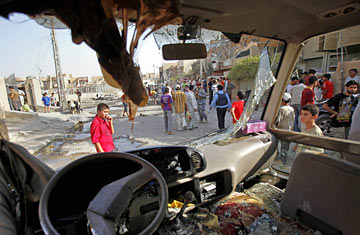
People inspect a damaged bus after a car bomb explosion in Baghdad.
Wednesday's enormous, killer blasts shattered more than ministry buildings in Baghdad. It also tore the tenuous hope that the country had come to a workable calm. The emerging details of the plot only infuriated a populace already outraged at a government that seems to have lost control of a security situation so soon after crowing nationalistically that it was back in charge as U.S. troops began their withdrawal.
The wired-up trucks that blew up and killed scores of people would have had to pass through checkpoints to get into the capital. How could they have gone undetected when they were loaded with water tanks full of chemicals and projectiles? One likely reason: they were assembled in Baghdad itself. Another detail enhanced the inside-job theories: the parking lot across from the Foreign Ministry, where the largest blast occured, is off limits to trucks. But security has been so lax that, just the afternoon before the attack, ordinary vehicles were not being inspected for explosives.
Two days later, in what was supposed to be the quiet Friday before Ramadan, the ministers of the defense, interior and national security and the head of the Baghdad Security Command were angrily grilled during a special meeting called by the deputy speaker of parliament and the defense and security committee of the legislature. Parliament is technically in recess and on holiday until the end of Ramadan (Sept. 19); only two dozen legislators were on hand. But the session, which started at 10 a.m. and lasted past lunch and into the afternoon, was so contentious the deputy speaker asked parliament security to drag journalists out even as MPs of the Sadrist bloc demanded they remain as witnesses for the Iraqi people.
"We have a big challenge and are facing a very big enemy," said Hadi al-Amri, chairman of Parliament's Security and Defense Committee. "Our duty is to make sure of the security for the people." Some members of parliament called for the sacking of the ministers of defense, interior and national security. "We are not in a battlefield, but we are in an intelligence battle," said Falah Hassan head of Sadr Movement. He and others were outraged that the head of intelligence Abdullah al-Shahwani was not in attendance. Others, though, excused Shahwani, citing the last minute nature of the session.
The government officials present acknowledged gaps in their policing and intelligence capabilities. But so far, only lower level employees have been fired or arrested; and the government says it will not yet fire any ministers or department chiefs, even as it looks to fast-track a realignment of the fragile, post-American security apparatus. Interior Minister Jawad Bolani urged patience: "We are continuing working. We are very confident about the performance of our security apparatus. We don't say that there are no bad elements in our apparatus. There should be suitable punishment to those who did bad performance, and also the punishment those who did these crimes against the innocent civilians." In a humbling political move, the Iraqis have accepted offers of intelligence and forensics assistance from the U.S. to track down the bombing culprits.
The government blamed religious extremists and remnants of the former regime of Saddam Hussein for trying to de-stablize an Iraq that that no longer relies on the U.S. military, which has been relegated to its bases since June 30, as part of the U.S.-Iraq status of forces agreement. Furthermore, without naming names, some politicians said Iraq's neighbors are also to blame for allowing fighters to cross the border, if not having a direct hand in the violence — "The dark powers," in the words of Prime Minister Nouri al-Maliki's political adviser Sadiq al-Rukabi. "They don't want a strong government in Iraq. And they try in one way or another to affect the progress of the Iraqi people."
Deputy speaker of parliament Khalid al-Attiya tried to radiate calm and unity at a press conference after the special session. "I have a message to all of the brothers, the journalists, and all the politicians," Attiya said, "What has happened is so big and sad and it reached all of the Iraqi people in all its factions, because this act didn't target the government or a specific sect in Iraq, or the security apparatus performance, or other blocks in the parliament. But this targeted all the Iraqi people." He went on to say that Iraqis "should stand in a cohesive way with its national government security apparatus who stays awake all night to secure them. We have to confirm today our confidence in our security apparatus, which we have built in our blood and in our sweat."
Government officials dodged reporters' attempts to get details on the potential firings. They also offered little to help Iraqis sleep at night. Indeed, predicted Rukabi: "There will be political, security and media pressures in order to escalate the situation from now until the elections." With the elections not till January 2010, the truck-bombings have become additional fodder for the country's volatile politics, which are even more frenetic as the political parties work on solidifying alliances and coalitions. Expect the campaign season to be long and rocky and explosive.
